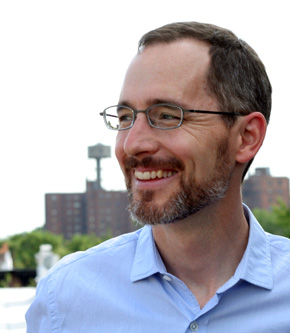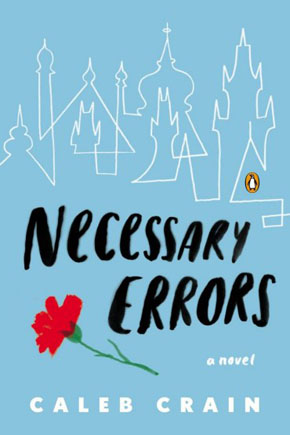The Wrong Time is More Fruitful:
An Interview with Caleb Crain
Evan McMurry

“Necessary Errors,” the first novel by literary critic Caleb Crain, is a wallop of a debut. A coming-of-age story of both Jacob, a young gay man searching for himself by teaching English in the post-Velvet Revolution Czech Republic, and of the city of Prague, searching for itself as it shakes off the gray shivers of Soviet rule, “Necessary Errors” is a complex, ambitious effort that refuses the consolation of stability. At every turn, formerly firm modes of identity are rapidly shifting, as Jacob and the Czechs introduce each other to the exhilarating anxiety—and price tag—of freedom.
Newfound Journal talked to Crain about the excitement and challenges of recreating a different time, so like ours in some ways and so removed in others, and a foreign land caught in a hinge of history.
From the point of view of a novelist, the wrong time is actually pretty interesting. It’s more fruitful. –Caleb Crain
EVAN McMURRY: What’s been your relationship to Prague? How did your personal feelings inform the novel, versus research or reading?
CALEB CRAIN: I spent a year in Prague about two dozen years ago, and the book draws on my memories. It is a novel, though; I made things up. When I came back to America, I went to grad school at Columbia, where I was supposed to be studying American literature, but I also took some Czech and studied Czech literature on the side. I even did some translation, under the guidance of a professor named Peter Kussi, who just passed away last fall. I translated a campaign biography of Václav Havel and a number of short stories. In the end I had to let translation drop, because it didn’t pay, I wasn’t all that good at it, and after all, I was supposed to be getting a PhD in American Literature and I had to choose which horse to bet on.
I guess you could call those years of engagement with Czech literature research, although I didn’t do any of it thinking that I was going to use it later in a novel about Czechoslovakia.
While I was writing the novel, I did do research, but only in an ad hoc way. If I needed to know something particular, I would try to find it. What a particular statue looked like. What the inside of a particular café looked like.
McMURRY: You’ve created an unfamiliar world in two respects—both the post-revolutionary period in Czech, and also a time very different in terms of gay culture. The appeal of Czechoslovakia after the Velvet Revolution is obvious, but what was it that drew you to this period in gay history? What was different then, compared to now?
CRAIN: It was a difficult time to be gay. The AIDS epidemic was in full swing, and there were a few national politicians who were signaling pretty clearly that it would be fine with them if the homosexuals all died of the plague. Being gay then seemed very political in a different way than it does now. If you tell someone you’re gay now, the first thing out of their mouth is, “Isn’t it great about gay marriage?” Back then the first thing was, “Are you going to die of this terrible disease?”
If you were a young person coming out of the closet, it was hard to find your way. On the one hand, there was terror and illness and political struggle. And on the other hand, there was this almost irrational optimism. All the people I knew who were coming out, we were certain that the world was going to be kinder to us than it had been even for those who had come out just ten years before. In a way this turned out to be true—look at the Supreme Court’s ruling on gay marriage last week. But it didn’t happen quite as fast or in quite the way we thought it was going to.
I didn’t want Jacob to know any more than someone like him would have known at the time. I was interested in what he didn’t know—in what, in his ignorance, he was able to make of these early tendrils. –Caleb Crain
McMURRY: The period in which your novel takes place is a little odd. It’s after the action, so to speak—the Velvet Revolution has already happened, and we’re in the post-honeymoon period, when Czechoslovakia’s long-awaited freedom has arrived as a dull transition largely marked by poverty. How did you decide to set your novel at the relatively non-dramatic period between the climax of the revolution and the flourishing of capitalism?
CRAIN: I have to admit, while I was in Czechoslovakia, I felt, like Jacob, that I was there at the wrong time. In retrospect, from the point of view of a novelist, the wrong time is actually pretty interesting. It’s more fruitful.
Also, when something first arrives, you can see it more clearly than you can later. After it’s managed to terraform the planet, there’s nothing left to compare it to. As I was writing the book, I kept thinking, Oh, actually, that was the first time I heard about X—about the threat of Islamic terrorism, for example. It certainly was the first time that one heard this sort of triumphalist note in the right wing of American politics. You know: We defeated the Soviet Union and therefore the particular strain of the capitalist system that we have must be the best of all possible worlds.
As I was writing, I kept seeing these seeds of the world we live in today. I didn’t want Jacob to know any more than someone like him would have known at the time. I was interested in what he didn’t know—in what, in his ignorance, he was able to make of these early tendrils.
McMURRY: There’s always a tension in historical writing between the research needed for verisimilitude, and the naturalness of the writing—how much historical detail is too much, etc. One example I thought you managed well was the voucher system introduced into post-Communist Czechoslovakia. You discuss this incident in an essay you wrote on Václav Havel, but it appears in the novel as a natural plot peripety. How did you manage that?
CRAIN: Imagine that twenty years from now, you want to write a novel set in 2013, and you want to write a conversation about gay marriage. You’ve probably had lots of conversations with friends and family about gay marriage, so you’ll know how those conversations go. Twenty years from now you won’t be able to recall them verbatim, but you’ll be able to reimagine them. The voucher plan was something that was happening while I was over there. It was in the air, the way gay marriage is today. You heard people talk about it. You overheard people talk about it.
I did look it up to see if my memory was accurate. And to see if the gossip that I remembered hearing had been accurate. It might be interesting to put inaccurate gossip into a novel, but before you did it, you’d want to know that it was inaccurate.

McMURRY: Conspicuously absent from the novel is the generation of Czech writers who would have been preeminent at the time: Havel, Ivan Klima, etc. I think I counted only one reference to Samizdat. Was there a conscious reason for this exclusion?
CRAIN: Well, the technical answer is that Jacob wouldn’t have been able to read them. Given the language barrier, it’s easier for Jacob to respond to the Czech visual arts and to architecture. That said, Havel does come up several times anyway, and there are oblique references in the novel to other Czech writers, though not by name.
The nontechnical answer is probably that I don’t think I’m really in the Czech literary tradition. What I mean is that I love Hrabal’s novels, I love Jiří Weil’s, I love Seifert’s poetry, I love Havel’s political philosophy, but I’m not more than a visitor in their tradition. Their works don’t resonate with me in the same way that, say, an Elizabeth Bowen novel does. I can’t trace a lineage for myself there.
McMURRY: The style and subject matter of the novel are very much of the late 19th Century—the American expat novel of Henry James, most of all. Was there ever a moment during the writing process when you wondered if the novel would be too anachronistic for a contemporary readership?
CRAIN: Every day. That’s a big question. I think you always write the kind of novel you want to read. I did wonder if my having spent several dozen years reading Melville and James ruined me. We’ll see.

Evan McMurry, Interviews Editor

0 comments on “Interview: Caleb Crain”